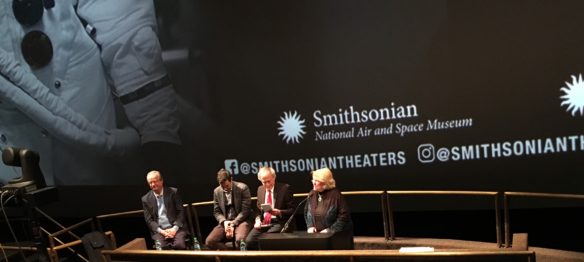
“That wasn’t a feel good movie. That was a feel nothing movie.”
Despite the technical excellence of the film, I agreed that the overwhelming sense was of loss and isolation. Not being intimately familiar with Neil Armstrong, I chalked things up to 2018-era existential angst.
Yesterday I was given the chance to attend a screening of First Man at the National Air and Space Museum, with Q&A following the film with Armstrong biographer, Dr. James Hansen, and Academy Award-winning screen-writer of First Man, Josh Singer. Jeffrey Kluger, the author whose book inspired the film Apollo 13, rounded out the panel.
If you are a fan of history and space and film, First Man: The Annotated Screenplay is a fantastic look into all three topics.
Whether watching First Man for the first time or considering a return, here are a few things you really should know to properly understand the brilliance of the film created by Singer and director Damien Chazelle[ref]Damien Chazelle won an Academy Award for La La Land and was the driving force behind transforming Hansen’s biography into a film.[/ref] based on Hansen’s book.
Armstrong was that distant in real life
Hansen interviewed Armstrong for 55 hours as part of the research process for his biography. He affirmed that the man was intensely private. Always polite, but loathe to talk openly about what things meant.
Hansen said he learned the most about Neil Armstrong by talking with key women in Neil’s life, including Neil’s first and second wives.
Janet left Neil in 1990
The film depicts the emerging strain on Janet due to Neil’s emotional unavailability. The film ends on a bleak emotional note, with the two spouses emotionally drained, unsmilingly touching the post-mission quarantine glass at the same spot from their separated rooms.
Because the film makers knew the toll the stress would eventually take on the marriage, they originally planned the final scene without even the touching through the quarantine glass. Janet Armstrong, seeing this, admitted that the seeds of the situation were there in 1969, but felt a complete absence of connection was not accurate. So the scene was shot as we see it, with Janet’s input.
Neil Undoubtedly Saved the Space Program
The film depicts the near-disaster of Gemini VIII, where the space capsule began to tumble at such a high rate of rotation that it nearly killed both Neil Armstrong and David Scott. Gemini VIII was NASA’s sixth manned space flight and represented the first in-flight system failure. Post-mission analysis confirmed that Armstrong and Scott had no causal role in the failure.
It is clear that deadly disaster was only averted because of Neil’s calm persistence in attempting to solve the problem. The same emotional compartmentalization that so marred Neil’s home life saved the space program.
Had Gemini VIII ended in deadly disaster, NASA could not have survived.
First Man is more accurate than a 1969-era telling would have been
There are numerous instances that were secret in 1969 – either because the individuals involved didn’t admit the event or the documents weren’t public.
Janet’s enraged confrontation with NASA officials when they turned off comms to her squawk box during Gemini VIII is one such instance. Though Claire Foy gives a great performance, those who were there say Janet was even more strong in her rage. Obviously such anger from an astronaut’s wife would not have been appropriate to admit in 1969, either for the wife or NASA.
The letter that was prepared for the President to read in case Armstrong and Aldrin became stranded on the moon was another instance that was unknown beyond a small circle. The speech was only discovered thirty years after the launch of Apollo 11.
A Critique
I had the chance to ask Hansen and Singer about the absence of faith from the film. They explained that this accurately expressed Neil Armstrong’s lack of faith in the Christian traditions of the era (he described himself as a deist). Hansen, Singer, and Kluger spoke of the earnest faith of other astronauts.
They explained that this film was true to Neil Armstrong’s point of view.
While I accept that I was wrong to think First Man was bleak because of 2018-era existential angst, I still think Singer and Chazelle missed an opportunity as they wrote and directed the screenplay. Had First Man been a novel told from only Neil’s point of view, his emotional palette would have appropriately dominated. But film is an “omniscient” medium, and should reflect more than the emotional situation of the main character.
Because they allowed Armstrong’s personal lack of overt religious faith to permeate the film, they missed (in my opinion) a chance to highlight how unusual Armstrong’s detacted affect really was. Armstrong comes off as merely the quietest of the quiet “Boy Scouts” who worked to realize President Kennedy’s dream of Americans reaching the moon.[ref]In The Right Stuff, it is Gus Grissom who is portrayed as the slightly inappropriate astronaut, his pockets stuffed with items which would have been in space. In First Man, Buzz Aldrin is portrayed as the gauche astronaut who says things that are inappropriate, highlighting the silent sacrifice of all the others.[/ref]
There are two funerals which could have served to inject this religious chiaroscuro. The filmakers used the “Can you play with me?” request from Neil’s son to emphasize the private sorrow Neil experienced. But a minor thing like showing the mourners hugging or comforting one another would have further emphasized Neil’s self-inflicted isolation and other-ness from his community, which was a community of faith.
I found that this lack of era-appropriate religious expression took me out of the film and made me initially doubt what I now see as an extraordinarily accurate film.
Critique aside, First Man is a film that deserves to be watched again and again, if we wish to understand the private cost of the public success America celebrated in 1969.